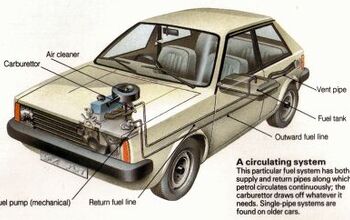Super Piston Slap: Fuelish Thought on Additives, Part II

Sajeev writes:
I received a brief but telling email from Mr. Hussam Adeni about a previous Piston Slap. The attachments he sent were an eye opener for someone as chemically challenged (so to speak) as yours truly. As you can see from the man’s resume, this won’t be a discussion for the faint of heart. But let me try anyway, it is a great read if you can channel your inner geek long enough in this age of twitter and rapid fire auto-tuned pop sensations.
Check out the PDF. For our International readership, the reduction in sulfur is a valid concern for your fuel system, and maybe the portion of an engine’s valve train that’s kissed by fuel on a regular basis. I know this is a problem for stateside motorists with older diesel-powered machinery: the low sulfur fuel does require an additive for older oil-burners to properly function over the course of years. While I am not certain how this impacts gasoline vehicles in the USA, the conclusion looks valid for the world in general:
“Unlike before, it has now become necessary to dose ‘after treatment additives’ to engines.”
So the implications of low sulfur fuels is real. They have less of the desirable properties seen in older, sulfur rich, fuels. Which begs the question, should you use a fuel additive? My guess is twofold: if you have a “keeper” of a vehicle for the next decade or more, yes. Not at every fill up and not if you use a gasoline that’s guaranteed to replenish what was lost from the sulfur. How’s that for an answer that doesn’t answer your concerns?
If this is a short term love, then no way. Which makes this much easier for a large number of our readership. Off to you, best and brightest.

More by Sajeev Mehta
Latest Car Reviews
Read moreLatest Product Reviews
Read moreRecent Comments
- Redapple2 Like the color but would never buy. Gladiator? Love them. (but some say they drive super wonky?)
- Redapple2 Note to layman. Lifts change the resting angles of suspension components. Then add full length of travel in the duty cycle and now you are repeatedly doing things to the suspension was never design for. Failures are very common and fatal. Do it only if you are stupid.
- Redapple2 Stampings vs castings>? If you go casting, you ve entered one of the most complex corners of manufacturing. In aluminum? 30 different popular alloys. 8 Core methods. 10 Casting methods. 5+ Heat treat options. Then we can talk about what metal to make the mold out of. The layman has no idea how complicated this gets.
- BlackEldo Anal grotto is NOT going to be happy about that H/K engine quip...
- Tassos GOOD CAR GOOD PRICE. MILEAGE IS DECENT CONSIDERING HOW LONG HONDAS LAST. THUS SPOKE REAL TASSOS. BIDEN DOLLARS


































Comments
Join the conversation
ComfortablyNumb I don't think you would be quite as sanguine if your engine was damaged due to lower lubricity. You probably couldn't prove it but you'd still be out the repair bill. I'd be comfortable with a car whose manufacturer states that the engine is designed for fuels meeting these standards. But with current cars' longevity, it seems there will be a period of years where owners of older cars might want to review the arguments for and against additives. Unfortunately, the back and forth are enough to cross a rabbi's eyes.
So here's a real question for the B&B. If there is a need for such additives, which additives will provide both the cleaning (I'm guessing: all) and the greater lubrication properties? I'm pretty sure the base STP injector cleaner for $1 does the first job, but have doubts about the second.